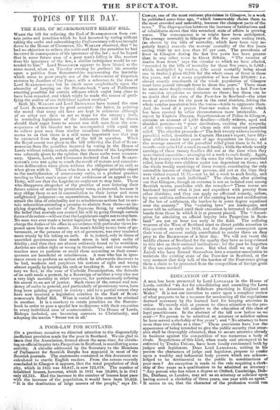TOPICS OF THE DAY.
TUE Eau, OF SCARBOROUGH'S RELLEF BILL.
WHEN the bill for relieving the Earl of SCARBOROUGH from cer- tain pains and penalties which lie had incurred by voting without taking the oaths and subscribingthe Parliamentary roll was brought down to the House of'Commons, Mr. WA/MET observed, that " he had no objection to relieve the noble earl from the penakies he had incurred in consequence of his ignorance of the law ; and he hoped that in some future case of a poor man's failing in like manner from his ignorance of the law, a similar indulgence would be ex- tended to him." Lord BROUGHAM appears to have hinted at the same moral, when on Tuesday evening he prefaced his remarks upon a petition from Soniersetshire representing the hardship which arose •to •poor people out of the enforcement of forgotten statutes by Justices of the Peace, with a reference to the case of Lord SC ARBOROUGH ; but he dwelt more emphatically upon the absurdity of keeping on the Statute-book " acts of Parliament enacting penatties for certain offences which ought long since to have been repealed, and which might be made the means of grati- fying the malice of one individual against another." Both Mr. WI,-XLRY and Lord BROUGHAM have turned the case of Lord SCARBOROUGH to good account : the latter, in pointing the moral that ninny old laws are kept in existence although of no other use than to act as traps for the unwary ; both, in reminding legislators of the inferences that will be drawn should their eager haste to screen one rich man from the con- sequences of his blunder not be accompanied with equal care to relieve poor men from similar vexatious inflictions. But it seems to us that there is a still more important use that may be extracted from the passing of the bill in question. When the Royal assent was given to the bill relieving the Earl of Scan- removed:1 from the penalties incurred by voting in the House of Lords without taking certain oaths, the sanction of the Legislature was solemnly given to the opinion that those oaths were unneces- sary. Queen, Lords, and Commons declared that Lord SCARBO- ROUGH'S vote was quite as much the result of mature and conscien- tious deliberation when given without the obligation of an oath as when given with it. Those who from a religious principle object Yo 'the multiplication of unnecessary oaths, as a profane practice tending to blunt men's sense of the awfulnessa of an appeal to the Deity, will see that the Legislature ought not to stop here. Those who disapprove altogether of the practice of men fettering their future course of action by promissory vows, as immoral, because it may oblige them to act in contradiction to their better and more enlightened judgment—as superstitious, because it leads men to attach the idea of criminality not to mischievous actions but to cer- tain solemnities attending a promise to abstain from them—as im- plying degrading notions of the Supreme Being, by establishing the belief that mortals can control his will by going through certain form sofdevotion—will see that the Legislature ought not to stop here. No man was ever made a better legislator by taking an oath to dis- charge the duties of his office in accordance with particular views im- posed upon him at the outset. No man's fidelity to any form of go- vernment, or the persons of any set of governors, was ever rendered more steady by his taking an oath. It is, indeed, only in times of unsettled governments that much stress is laid upon oaths of fidelity ; and then they are almost uniformly found to be worthless. Actions are either right or wrong in themselves; and true morality teaches men to perform or avoid them according as their conse- quences are beneficial or mischievous. A man who has in igno- rance sworn to perform an action which he afterwards discovers to be bad, weakens and perplexes his notions of right and wrong almost equally by keeping his oath or breaking it. In our own his- tory we find, in the case of Catholic Emancipation, the formula of an oath made a present, by a Sovereign of 'neither a very nice nor a very high morality in other respects, for pertinaciously refusing his assent to an act of justice. Such views of the nature and ten- dency of oaths in general, and particularly of promissory vows, have long been gaining ground in society ; and to a partial extent they have now received a legislative sanction in the Earl of SCAR.. BOROUGH'S Relief Bill. What is venial in him cannot •be criminal in another. It is a mockery to retain penalties on the Statute- book in order to pass a special law to dispense with their execution in every individual case of contravention. The House of Lords, Bishops included, are becoming converts to Christianity, and adopting the maxim " Swear not at all.'


























 Previous page
Previous page